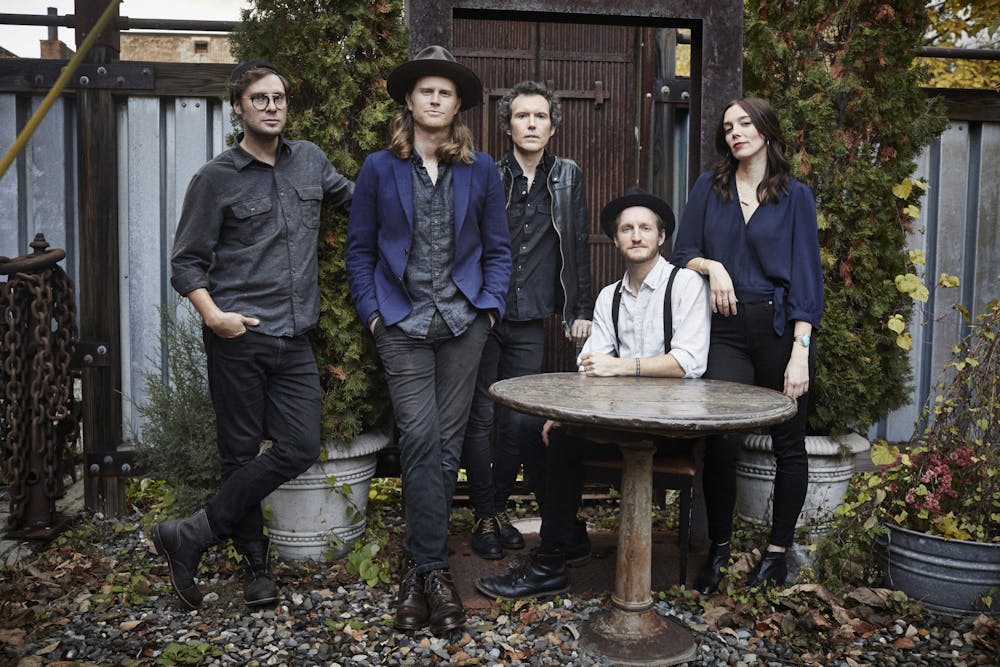The Lumineers are making their first-ever stop in Buffalo for “III, The World Tour” with Mt. Joy and J.S. Ondara, and will take the stage at KeyBank Center on Feb. 26.
“III,” the band’s third album, reached No. 2 on the Billboard 200 after its September release. The album consists of three sections, each representing a different member of a family struggling with addiction.
Jeremiah Fraites, drummer and co-founder of The Lumineers, talked to The Spectrum ahead of the show about his brother’s addiction, the importance of sadness in art and the upcoming tour.
The interview, lightly edited for style and length, follows below:
The Spectrum: This is your second arena tour, are the feelings leading up to it different than for the “Cleopatra World Tour?”
Jeremiah Fraites: Yeah, I think I’m more excited. I know I’m more excited. I think the second album had its own set of strangeness because [with] the first album we saw a lot of success on an international scale and that was really great, but it was also kind of strange to deal with in a lot of ways. ... I’m really excited for this third-album tour cycle. These are some of the biggest shows that we’re playing in the U.S. That’s where we’re from so that’s obviously really cool that we get to do that and get to experience that.
I also think that this is our best album that we’ve ever written. A lot of bands and artists probably think their most recent work is, that’s always the case, but I honestly think that this is our best album that we’ve ever written. I think there’s so much depth to it ... I think that it feels so much like something that is, I don’t want to use the word unique, but it’s something that me and the singer have been writing for 15 years now. And there’s something about it taking that long ... taking 12-13 years for us to finally sound like ourselves if that makes sense. I think that’s something really cool and this was just a really fun album to make and write ... We’re super excited to go back out there.
TS: At the beginning of the last decade you were on a self-financed tour. Did you ever see the band getting this big? What are your biggest goals for this decade?
F: Definitely never ... I think there was a part of me that wanted it to get this big probably, but I never thought it would actually get this big. So, super thankful, super grateful that it did and I think the next decade is sort of just to continue to make music that I really care about ... The one trap I never want to fall into, and this is something I kind of obsessed about, is being one of those bands that feels compelled to make music to make music or put out music so fast. At this point I’d say [it’s] even stereotypical [that] every two years you put out an album or something and that’s just absurd to me, for sure the quality is going to start to wane and decrease. So I think for us, it all harks back to how we got here, just to write music is the thing I care most about.
[For some artists] I think it’s kind of like, “Okay nice, now we have success to start out. How much can we just chill? How can we go on vacation permanently? How can we retire?” [For us] it’s kind of the opposite. And for me, a writer, to choose between tour and writing, I love writing a lot more. I have fun on tour for sure but I love writing way more. So [the goal] in the next decade is just see how much more we can write and keep writing stuff that we find interesting and fun to do.
TS: Are there any songs you feel like you’ve grown out of since they were released?
F: I think certain songs off the first album, it’s funny … it’s an interesting concept, like if songs like “Ho Hey” or songs like “Flowers In Your Hair” or, I don’t know, “Big Parade” or “Stubborn Love,” these are all songs off the first album you would probably do now just because you’re older. That also doesn’t say that you would make them better, I mean you’d probably make them worse. It’s just an interesting thing, the third album to me feels so much different than the first album, and then the second one probably lies in between the two. … Sometimes it’s like we’re covering someone else’s songs at shows. I still love [“Ho Hey”] and to be honest, I love all the songs and I don’t mind playing any of them … So I don’t think we grew out of it but it’s just interesting how that feels sometimes and then the new songs on the third album, these are definitely our songs, these are new and obviously playing new stuff is always very exciting. You just hope that the crowd agrees.
TS: “III” is broken into three parts, each with a different perspective on addiction, something you have close experience with. Is there one part or one song that means the most to you right now?
F: That’s a good question. They all mean a lot to me right now. I think it’s interesting because I think “Salt and the Sea” means the most to me right now, personally, because it actually has nothing to do with addiction or drugs or alcohol, but it’s probably the [song I’m] most proud of. The Lumineers’ last song on the album, “Salt and the Sea” and it’s actually really cool because there’s like a theme or a motif in that song where it sounds like there’s this delayed piano. And it’s actually the first creative idea I ever wrote on the computer, and it was really cool to use my first-ever creative piano original idea on the last song of the album. Coincidentally, I just looked it up today and I was looking for old files to my computer and it was from Christmas Eve 2004. So the idea is about 16 years old, give or take, which is kind of crazy.
But in terms of hitting more specifically your question, I think there’s a certain line, it’s in “Leader of the Landslide” ... certain things get conveyed where it just means a lot to me. I lost my brother to a drug addiction, he was 19 and he died about 19 years ago. And I think there’s a lot of lyrics on “Leader of the Landslide” that really paint a picture that even though Wes wrote all those lyrics — he was dealing with someone in his family going through alcoholism — it just really does connect with me, every night we play that song.
It feels like a heavy, sad song but I think that’s actually really good and we’ve gotten comments from people that “the album is so sad” or “these songs are so sad” and I’m like, “Be honest, what music or art changes your life for the better that’s super happy and super sugary?” … So these things that are sad in our lives actually improve it. I think at first, I was worried about a bit of backlash or responses like, “Oh, this is a sad album,” but then I was kind of like, “F--k that.” I mean, all the music and all the art that’s truly inspired me and improved my life, ironically, came from a sadness or came from a heavy place.
TS: The music videos for the album were made into a film. What’s it like watching the film and its culmination of all those feelings and experiences?
F: That was pretty intense. That was cool, though, the film itself got into the Toronto International Film Festival and that’s a really big deal and that was really cool. ... It’s just crazy for it to be thought of as a film and appreciated as a film because it very much was like that and it was a heavy experience but it was beautiful to watch them all together. We watched a lot of the edits in the privacy of our own home with a private link with the password or whatever, but actually being in a room with a bunch of strangers watching it certainly gave it a new gravity, a new heaviness, a new meaning and a new significance and it was really beautiful to watch all that.
TS: I know Wesley Schultz said the album is a narrator to the film. Was it difficult to keep one medium from overpowering the other when you were making them?
F: I think no, we got this director named Kevin Phillips and he made this movie called “Super Dark Times” and we loved the film. ... And it was just really cool to realize “Okay, he’s our guy, this is gonna be great.” We knew he knew how to make it, to keep the griminess, so to speak, to keep it feeling raw, and we told him, “Hey, we don’t want to hire models and we don’t want to hire good looking people, whether male or female, we don’t want to hire people that don’t look like the people they’re portraying,” we really want to keep this thing, I think the key word was raw, and I think he did a really, really great job as far as working with the casting director finding people that seem to fit the parts really well. ... I can’t unsee these shots in my head which is actually pretty cool, every time I hear the music, I’m kind of seeing the film again in my head.
We really wanted to make sure that each music video could eventually be spliced together to make it feel like a film. But the challenge for the director was also that each music video would be able to stand alone and be interesting, so he had a much more difficult job.
TS: I looked around and couldn’t find any past Buffalo shows for you. Is this really your first time here?
F: Yeah, I was going to say I think it might be. I know that we’ve played a couple of shows in the area, I don’t remember every show and New York is big, but it might actually be the first bona fide show in Buffalo which I think is really cool. Unfortunately, maybe for people in Buffalo, New York City takes all the bands and then maybe people don’t go up to Buffalo so I’m really excited that we get to go up there because I’m from New Jersey and I think … there’s so much to see other than New York City. New York City is great obviously, but New York State is so beautiful.
TS: Are you going to do anything special to celebrate?
F: Well, I don’t know, we’re going to play the show and hopefully it’ll be good, and I’ll be out with my wife and young son so I don’t know if I’ll celebrate but the show will be the celebration if that’s a good answer.
Lauryn King is assistant managing editor and can be reached at lauryn.king@ubspectrum.com and on Twitter @LaurynSKing.

Lauryn King is the assistant managing editor for The Spectrum. She’s a busybee and copy editor at heart.





